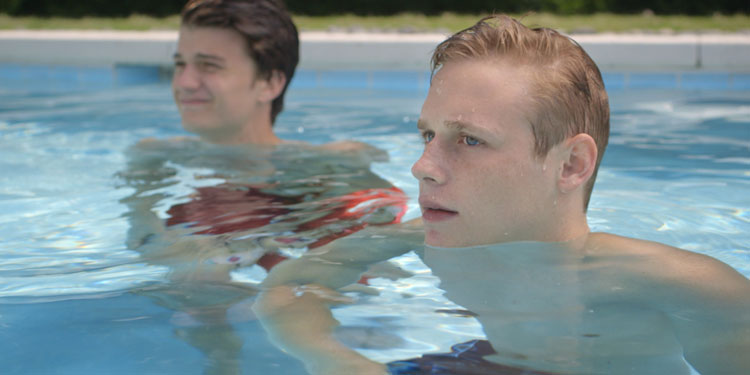
Director: Stephen Cone
Running Time: NR
Certificate: 87 mins
Release Date: May 3rd 2016 (US)

As the title of the film suggests, American teenager Henry Gamble is having a birthday party to mark turning 17. His preacher father wants his son to have a good celebration, but also keen to ensure the party gives off the right godly vibe to both the adults and youngsters – including the members of a religious youth group – who will be there. However, as the party goes on, it becomes clear that problems are lurking under the surface.
For a start, Henry may be gay and in the closet, but is avoiding the only gay boy at his party due to what people may think, even though he’s been just been masturbating with a straight friend. His friends and sister are having issues with dating and sex, made more difficult by the fact their religious upbringing has made them somewhat ashamed of acting on their impulses – even if it doesn’t actually stop them acting on them.
Things aren’t perfect with the adults either. Henry’s parent’s marriage is going through hidden trauma that may cause it to implode. Then there’s Ricky, who comes to the party not too long after a suicide attempt (possibly related to his sexuality). However, while he may have hoped to have been welcomed back into the community of the church with compassion, he finds that people aren’t sure what to do with him and that as he doesn’t 100% fit with what they’ve decided is ‘good’ and umblemished, they push him to the side (without thinking that’s what they’re doing) rather than properly helping him.
At the start of Henry Gamble’s Birthday Party, you could be forgiven for thinking it was just going to be another gay-themed movie highlighting the hypocrisy of religion. However, it’s a bit subtler than that, instead looking at how trying to create an image of perfect Christianity and perfect Christian people, is both impossible and may actively do a disservice to each individual person and their ‘imperfect’ issues.
With Ricky, those around him treat him as a problem and something to be dealt with so they can continue to pretend everyone and everything is still perfect. They’re so busy thinking about that, that they fail to see him as an individual person and the struggles that he’s facing – indeed, they end up adding to them by unwittingly making him feel like he’s getting in the way and is no longer fully welcome in something that has long been a key part of his life.
Likewise, Henry’s father is initially keen that everything at the party gives off the right impression – no alcohol (for adults or kids), suitably innocuous music and the image of an idyllic preacher’s family of devoted wife and pious son and daughter. However, the mask begins to slip as his wife subtly pushes back against this unrealistic image, his daughter wrestles with the fact she gave up her virginity, and Henry wonders whether there’s really anything wrong with being gay and whether actually the thing he’s been doing wrong is ignoring his gay friend at school.
The film also shows that it’s not purely a generational thing, with some of the younger party-goers portraying a rather arrogant, paternalistic Christianity which again feels like a group of people talking about the world in theory rather than practice. The hypocrisy that religion sometimes brings is definitely there in the film, but the movie isn’t interested in a pure ‘us vs. them’ dichotomy, instead winding its way through the possibility of a middle ground, a more realistic way forward that doesn’t necessarily have to completely deny religion, but which accepts the messiness of real people and looks it in the eye. It’s a movie that doesn’t just want to say that being perfect is an illusion, but also that it is foolish to think you absolutely know what perfection is, no matter what religion or philosophy you follow.
Click here to watch the trailer for Henry Gamble’s Birthday Party
There are moments when the film feels like it’s gotten a tiny bit lost and isn’t sure where it’s going, but then it always manages to pull itself back, setting Henry in amidst a sea (or actually a swimming pool that the movie uses in metaphorical way) of different influences and ideas, whether its atheism, lesbian and gay friends he isn’t sure how to deal with, a father who wants to present a particular image to the world and a mother who wants a more realistic, authentic life.
Although some will find the movie a little dull – largely because for most of its running time it wants to make its points subtly and slowly, building tension in a way that initially deliberately avoids too much melodrama – it’s a film that’s worth sticking with, as it unpacks its characters and the issues underneath the constructed surface of the world they live in.
Overall Verdict: Henry Gamble’s Birthday Party is a slow build, but a worthwhile one, with one teenager dealing with his sexuality at the centre of a look at religion, families, the pressures of youth and the danger of attempting to construct an image of the world that cannot match the reality.
Reviewer: Tim Isaac
Gay?
Exciting?
Dramatic?
Funny?
Romantic?
Scary?
Sexy?
Family Friendly?
Leave a Reply (if comment does not appear immediately, it may have been held for moderation)